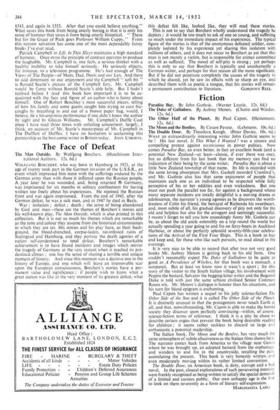Fiction
Paradise Bay. By John Guthrie. (Werner Laurie. 12s. 6d.)
The Moon and the Bonfire. By Cesare Pavese. (Lehmann. 10s. 6d.) The Double Door. By Theodora Keogh. (Peter Davies. 10s. 6d.) WHAT an extraordinarily interesting writer John Guthrie seems to be ! His last novel, Is This What I Wanted ? was a sincere and compelling protest against mysticismus in power politics. Now comes Paradise Bay, an even better, in fact an excellent book (and a potential New Zealand—at least—classic, if ever there was one), but so different from his last book that my memory can find no indication of their being by the same writer. Paradise Bay is about a little New Zealand township of that name. Its life is recorded with the same loving absorption that Mrs. Gasket! recorded Cranford's, and Mr. Guthrie also has that same enjoyment of people that maintains each one as an individual to be respected while fully perceptive of his or her oddities and even wickedness. But one must not push the parallel too far, for against a background whose many separate incidents are totally delightful is a moving drama of adolescence, the narrator's young agonies as he discovers the worth- lessness of Colin his friend, the betrayal of Richenda his sweetheart, and, most subtle of all, his gradual discovery of pity not only for the old and helpless but also for the arrogant and seemingly successful. I mustn't forget to tell you how exceedingly funny Mr. Guthrie can be, as about the old uncle ostensibly on a trip round the world but actually spending a year going to and fro on ferry-boats in Auckland Harbour, or about the perfectly splendid seventy-fifth-year celebra- tions of the Arrival of the First Four Ships. This is a book to buy and keep and, for those who like such pursuits, to read aloud in the evenings.
It is very nice to be able to record that after two not very good books Mr. Aubrey Menon is getting back to his old form. One couldn't reasonably expect The Duke of Gallodoro to be quite as good as A Prevalence of Witches, for that book was a nonsuch, a nonpareil. But at least we know now it wasn't a sport ; for this story of the visitor to the South Italian village, his involvement with Peppin the bastard, Salvator the begging-letter writer and the Bogomil Duke is told with just the same urbane civilised Senior Common Room wit. Mr. Menon's dialogue is funnier than his situations, and his turn for bland epigram is enchanting.
Paul Capon has written a sequel to his jolly science-fiction The Other Side of the Sun and it is called The Other Side of the Planet. It is distinctly unusual in that the protagonists never touch Earth at all, and that, notwithstanding, Mr. Capon is able to make the horrid society they discover seem perfectly convincing—within, of course, science-fiction terms of reference. I think it is a pity he chose to describe certain orgies that prevent the book being desirable reading for children ; it seems rather reckless to discard- so large and enthusiastic a potential readership. The Italian book, The Moon and the Bonfire, has very much the same atmosphere of subtle allusiveness as the Italian films shown here. The narrator comes back from America to the village near Genoa where he was brought up, an adopted bastard from the orphanage, and wanders to and fro in the countryside, recalling the past, assimilating the present. This book is very honestly written, and even moderately moving within its rather limited convention. The Double Door, an American book, is dirty, corrupt and a bad novel. In the past, cloacal explorations of such persevering intensity were frankly recognised as being written to satisfy the special demands of a limited and curious public. Our own unhappy age is the first to look on them reverently as a form of literary self-expression.
MARGHANITA LASKI.










































 Previous page
Previous page